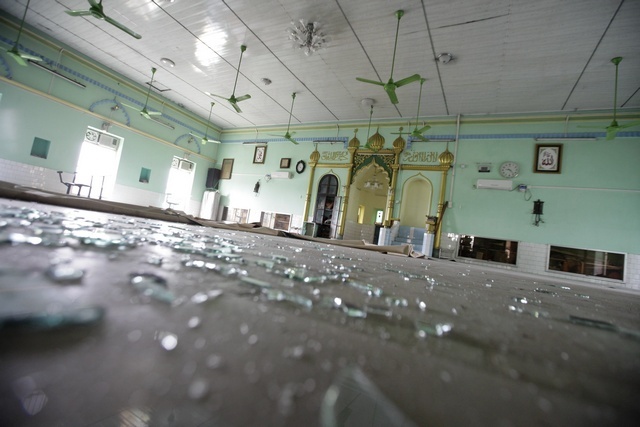As Muslims celebrate the holy month of Ramadan, Islamic communities in riot-stricken areas have been forced to make due with fewer religious facilities after mosques were razed or officially closed following bouts of sectarian violence that rocked cities across Burma during the last year.
According to activists, authorities have only allowed three of Meikhtila’s 14 mosques to reopen after local officials closed the remaining Islamic religious centres that were left standing following the riots that erupted on 20 March.
While Muslim residents in the city are filling mosques that have been reopened, there is not enough space to accommodate all of the members of the community.
“During Ramadan, we have to say Namaz prayer and a lot of worshippers show up during that time so we had to ban children as there was not enough space,” said Meikhtila resident Ma Sandar during an interview with DVB.
“We wish that all the mosques would be allowed to reopen.”
Officials reopened the Tharyargon Mosque and Turaky (Turkey) Mosque last month both of which are on the outskirts of the town, reported Ma Sandar.
Secretary of the Islamic Religious Affairs Council-Myanmar Wunna Shwe said his group has been pushing authorities to reopen more mosques, but officials have been slow to respond.
“We are sad that we cannot use our mosques during [Ramadan],” said Wunna Shwe. “We have made requests to the government to allow the mosques to reopen.”
However, the deputy-director of the Department of Religious Affairs Soe Naing said the decision rested in the hands of local officials.
“Mosques in Lashio and Meikhtila can be reopened with the approval from the local government administration given that they can provide security measures,” said the deputy director.
“The Ministry of Religious Affairs has no direct authority to allow them to reopen.”
In Arakan state, more than 60 mosques were destroyed reported activists after two bouts of rioting kicked off in June and October 2012.
According to the chairperson of the Myanmar Muslim Youths’ Religious Organisation Myint Htun, authorities have yet to provide the state’s Islamic residents with the necessary permission to rebuild the mosques.
During a speech in London on Monday, President Thein Sein said his government was committed to bringing an end to religious and ethnic violence in the country after more than 150,000 residents were displaced and hundreds killed during the religious-based violence in Burma last year.
“I promise you that we will take a zero tolerance approach to any renewed violence and against those who fuel ethnic hatred,” said Thein Sein at the Chatham House in London.
“We cannot let ethnic or religious difference become an excuse to revert to authoritarianism”
On Tuesday, Thein Sein’s office informed the union parliament that the state of emergency issued under a presidential decree in Meikhtila would be rescinded on 20 July.
The state of emergency was issued on 22 March and effective for 60 days; however, the measure was extended by another three months during an emergency parliamentary session on 20 and 21 of May.
-Additional reporting provided by Saw Nang



